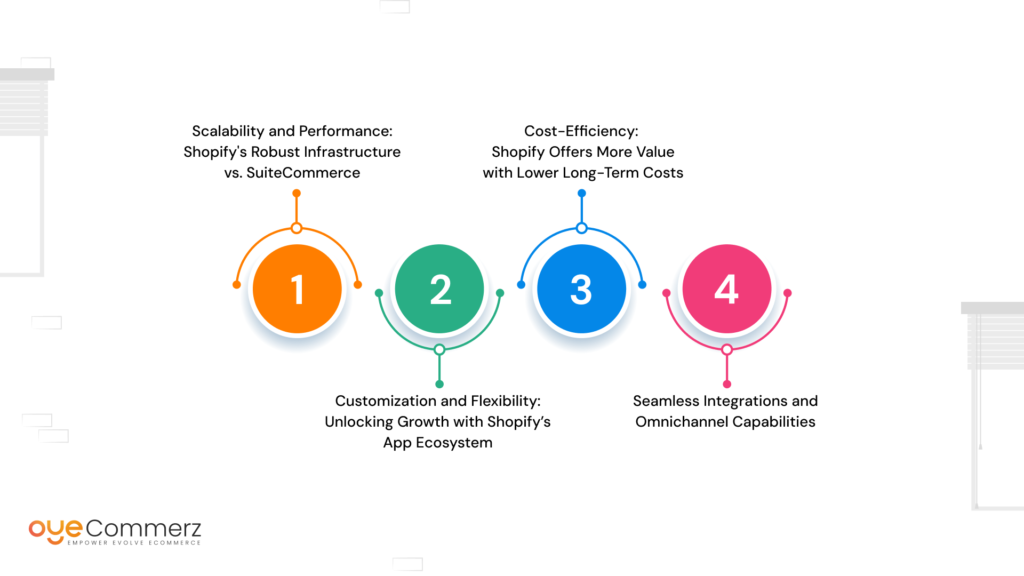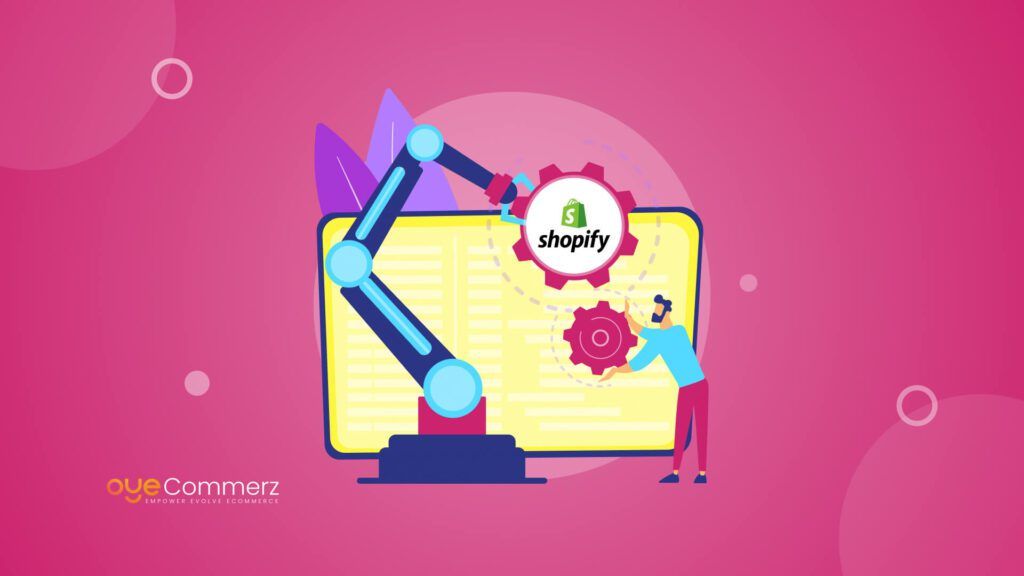In the competitive e-commerce landscape, choosing the right platform is crucial for business success. Over recent years, a noticeable shift has occurred, with enterprises moving away from legacy platforms like SuiteCommerce and transitioning to Shopify. This migration is not a mere trend; it is driven by compelling reasons such as scalability, ease of use, cost-effectiveness, and the robust ecosystem that Shopify offers. For decision-makers at enterprise-level e-commerce businesses, understanding the advantages of Shopify over SuiteCommerce is critical to maintaining competitive edge and operational efficiency.
This article will delve into the top reasons why enterprises are switching from SuiteCommerce to Shopify, with a focus on technical capabilities, cost savings, flexibility, and significant improvements in user experience. With data-driven insights and quotes from industry experts, this analysis provides a comprehensive guide for businesses considering a migration, shedding light on how this strategic decision can optimize operations and drive growth.

Table of Contents
Toggle1. Scalability and Performance: Shopify's Robust Infrastructure vs. SuiteCommerce
One of the top reasons enterprises are switching from SuiteCommerce to Shopify is the scalability that Shopify provides. As companies grow, their e-commerce platforms must scale seamlessly to handle increased traffic, sales, and operational complexity. Shopify has built its reputation on providing a flexible, cloud-based infrastructure capable of handling large volumes of transactions without compromising speed or performance.
Shopify’s Global Performance Edge
Shopify powers over 4 million e-commerce sites globally, including large brands like Tesla, Red Bull, and Gymshark. The platform is renowned for its ability to handle massive sales volumes and high-traffic spikes without downtime. This scalability is particularly vital for enterprise businesses that experience seasonal or event-driven traffic surges, such as during Black Friday sales.
Unlike SuiteCommerce, which often requires substantial custom development and infrastructure management, Shopify offers a hands-off approach. It automatically allocates resources to maintain performance during peak times, ensuring websites remain fast and responsive. For enterprises aiming to streamline operations while ensuring uptime and performance, Shopify’s infrastructure outshines SuiteCommerce in delivering a smoother, more scalable solution.
Cost of Ownership and Performance Maintenance
Enterprises switching to Shopify often cite the hidden costs and complexities of maintaining SuiteCommerce. Site performance directly impacts revenue, especially as customers expect faster load times. According to Google’s Mobile Speed Benchmark Report, a 53% increase in bounce rates occurs if a site takes longer than 3 seconds to load. Shopify’s integrated global CDN significantly improves load speeds compared to SuiteCommerce, ensuring a smooth and fast customer experience. This is because Shopify’s platform is managed and hosted entirely on the cloud, eliminating the need for costly infrastructure management, IT support, and server maintenance.
Key Benefits of Shopify Scalability:
- Unlimited Bandwidth: Supports high-traffic websites without throttling or performance degradation.
- Global CDN: Shopify uses a global content delivery network (CDN), ensuring faster load times for international visitors.
- Automated Scaling: Built-in scaling during high-traffic periods ensures uptime and reliability.
2. Customization and Flexibility: Unlocking Growth with Shopify’s App Ecosystem
Enterprises require a platform that not only supports their current needs but also provides the flexibility to adapt to future growth and innovation. SuiteCommerce, while a powerful tool, often lacks the flexibility and ease of customization that businesses need in today’s fast-paced market. Shopify’s vast app ecosystem and highly customizable storefronts give it a distinct advantage in this area.
Shopify Offers Unmatched Flexibility for Customization
Shopify provides enterprises with a wide range of customization options, allowing businesses to create unique customer experiences. Unlike SuiteCommerce, which often involves extensive custom coding to enable certain features, Shopify integrates easily with third-party applications. Its API-first approach means that businesses can extend the platform’s functionality with minimal development effort.
According to a report from eCommerce analyst Andrew Youderian, “The availability of over 8,000 apps on the Shopify App Store is a game-changer for businesses looking to innovate quickly without being tied to custom development cycles.” This flexibility allows enterprises to scale faster, experiment with new features, and implement changes more efficiently compared to SuiteCommerce.
Tailored Solutions for Enterprise Needs
Shopify also offers powerful enterprise-level customization options such as the Shopify Scripts Editor, which allows developers to create custom shopping experiences at checkout. This level of personalization helps businesses tailor their stores to specific customer needs, driving higher engagement and conversion rates.
The headless commerce approach that Shopify offers allows enterprises to decouple the front-end presentation layer from the back-end functionality. This enables businesses to deliver immersive, dynamic customer experiences while ensuring the back-end operates smoothly. SuiteCommerce lacks this kind of headless flexibility, often making it harder for enterprises to keep up with fast-evolving design trends and customer expectations.
Key Customization Advantages of Shopify:
- Access to Over 8,000 Apps: Extend your store’s functionality quickly with plug-and-play integrations.
- Headless Commerce Capabilities: Create a custom front-end experience while leveraging Shopify’s back-end power.
- Custom Checkout Experiences: Build unique, branded checkout flows with Shopify Scripts.
3. Cost-Efficiency: Shopify Offers More Value with Lower Long-Term Costs
For enterprise-level businesses, one of the most critical factors when choosing an e-commerce platform is cost-efficiency. Migrating from SuiteCommerce to Shopify often brings significant cost savings, as Shopify’s pricing model is designed to provide predictable and transparent pricing, without the need for excessive add-ons or hidden fees.
Lower Total Cost of Ownership
The cost of maintaining and operating a SuiteCommerce site can become exorbitant, especially when factoring in custom development, updates, and infrastructure costs. Shopify, on the other hand, offers a more affordable solution. Businesses switching to Shopify often see a dramatic reduction in their total cost of ownership. With Shopify, enterprises get all-inclusive pricing that covers hosting, security, updates, and support. This predictable cost structure allows businesses to allocate their budget more effectively, focusing on growth rather than upkeep.
A recent Shopify study reported that enterprises typically save between 20% to 30% in platform costs when migrating from legacy systems like SuiteCommerce. This cost-saving can be reinvested into marketing, customer acquisition, or expanding product offerings, giving businesses a competitive advantage in their respective markets.
Reduced Development and Maintenance Costs
SuiteCommerce often requires extensive custom development for even basic functionalities, which increases the time and cost associated with launching new features. In contrast, Shopify’s app ecosystem allows businesses to implement new functionalities quickly and affordably, without requiring extensive development resources.
Cost Benefits of Shopify:
- All-inclusive pricing: Covers hosting, maintenance, and updates.
- Lower development costs: Leverage pre-built apps and integrations.
- Savings in maintenance: Managed platform means no server or security costs.
Also Read: SuiteCommerce Advanced vs Shopify – Detailed Comparison
4. Seamless Integrations and Omnichannel Capabilities
As enterprise businesses grow, so do their operational complexities. Today, many enterprises require seamless omnichannel experiences that allow customers to engage with their brand across multiple touchpoints, whether online, in-store, or via mobile. Shopify excels in integrating omnichannel solutions compared to SuiteCommerce, providing enterprises with the tools they need to unify customer experiences.
Streamlined Integration with Leading Tools
Shopify provides seamless integrations with a wide array of business tools, from ERP systems like NetSuite and SAP to marketing automation platforms like HubSpot and Klaviyo. These integrations are vital for businesses looking to streamline operations and improve customer experiences.
SuiteCommerce, while powerful, often requires custom integrations that take time and development resources to implement. Shopify’s built-in app ecosystem and robust APIs make integrations far more straightforward. For example, Shopify Flow allows businesses to automate tasks such as sending reorder requests to suppliers or tagging high-value customers, significantly improving operational efficiency.
Unified Omnichannel Experience
In the age of omnichannel retail, customers expect a seamless experience regardless of where they shop. Shopify provides enterprises with powerful omnichannel capabilities that unify online and offline experiences, from integrated point-of-sale (POS) systems to real-time inventory tracking across multiple locations. This unified approach ensures that businesses can meet customer expectations while maximizing operational efficiency.
In contrast, SuiteCommerce lacks the built-in omnichannel capabilities that Shopify offers, often requiring custom development to integrate POS systems or synchronize inventory.
Omnichannel Strengths of Shopify:
- Integrated POS: Sync online and offline sales channels.
- Omnichannel Inventory Management: Real-time tracking across warehouses, retail stores, and online channels.
- Automated Workflows: Improve efficiency with Shopify Flow integrations.
Similar Read: Shopify Plus Integration with NetSuite – Full Guide
Ready to Switch from SuiteCommerce to Shopify?
At OyeCommerz, we make the transition from SuiteCommerce to Shopify seamless and stress-free. Our expert team specializes in Shopify migrations, helping businesses of all sizes, from startups to enterprises, migrate smoothly and effectively.
With our skilled migration services, we handle everything from data migration to custom Shopify development, ensuring your store is optimized for performance and growth. Whether you need platform integration, UX/UI enhancements, or a tailored Shopify solution, we’ve got you covered.
Contact OyeCommerz today to discuss how we can help your business thrive on Shopify!
Contact to Migrate your Site to Shopify Now
Conclusion
In an increasingly competitive e-commerce landscape, enterprise businesses need platforms that are flexible, scalable, and cost-efficient. Shopify has emerged as the go-to solution for enterprises seeking to optimize their operations, reduce costs, and deliver exceptional customer experiences.
Migrating from SuiteCommerce to Shopify offers a range of benefits, from the platform’s scalability and flexibility to its lower total cost of ownership and seamless integration capabilities. For enterprises looking to stay ahead of the curve and scale their operations, Shopify is a clear choice that empowers businesses to innovate quickly and maintain a competitive edge.
With its advanced technical infrastructure, robust app ecosystem, and focus on customer experience, it’s no wonder that more and more enterprises are making the switch from SuiteCommerce to Shopify.




